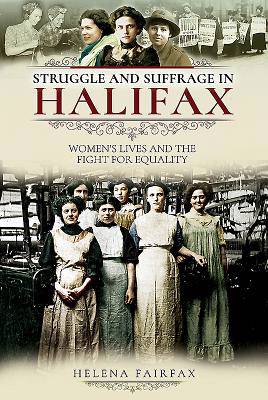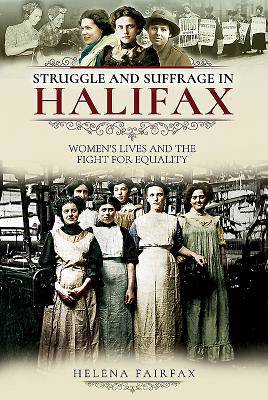
- Retrait gratuit dans votre magasin Club
- 7.000.000 titres dans notre catalogue
- Payer en toute sécurité
- Toujours un magasin près de chez vous
- Retrait gratuit dans votre magasin Club
- 7.000.0000 titres dans notre catalogue
- Payer en toute sécurité
- Toujours un magasin près de chez vous
20,95 €
+ 41 points
Description
Between 1800 and 1950 the town of Halifax grew beyond recognition. The booming mills and factories were built on the labor of women and their children, and yet their voices are almost completely missing from the history books. For the first time, this is the story of Halifax from the point of view of the women who helped shape the town.
This was a period of extraordinary change, but the battle for equality was long. In 1800, many women were illiterate. By 1900, there was a thriving girls' high school in Halifax, and yet one of its most brilliant students was denied a full degree because she was a woman. In 1939, the Vicar of Halifax called women's economic independence "an evil".
Families were large and women regularly died in childbirth. Many faced the stigma of single parenthood or else the terror of an illegal abortion. In the 1930s, the first Family Planning Clinic was set up by women in the town.
In the 1840s, women in Halifax fought for their menfolk's right to vote. In 1911, when Emmeline Pankhurst gave a stirring speech at the Mechanics' Institute, women had yet to be granted a vote of their own, leading many women to boycott that year's census and at least two to declare their occupation as "slave".
From girls in the factories to the first women stepping into public office, this book provides a fascinating and moving account of the lives of Halifax's women through the key events in the town's history.
This was a period of extraordinary change, but the battle for equality was long. In 1800, many women were illiterate. By 1900, there was a thriving girls' high school in Halifax, and yet one of its most brilliant students was denied a full degree because she was a woman. In 1939, the Vicar of Halifax called women's economic independence "an evil".
Families were large and women regularly died in childbirth. Many faced the stigma of single parenthood or else the terror of an illegal abortion. In the 1930s, the first Family Planning Clinic was set up by women in the town.
In the 1840s, women in Halifax fought for their menfolk's right to vote. In 1911, when Emmeline Pankhurst gave a stirring speech at the Mechanics' Institute, women had yet to be granted a vote of their own, leading many women to boycott that year's census and at least two to declare their occupation as "slave".
From girls in the factories to the first women stepping into public office, this book provides a fascinating and moving account of the lives of Halifax's women through the key events in the town's history.
Spécifications
Parties prenantes
- Auteur(s) :
- Editeur:
Contenu
- Nombre de pages :
- 176
- Langue:
- Anglais
- Collection :
Caractéristiques
- EAN:
- 9781526717771
- Date de parution :
- 19-04-19
- Format:
- Livre broché
- Format numérique:
- Trade paperback (VS)
- Dimensions :
- 155 mm x 231 mm
- Poids :
- 498 g

Les avis
Nous publions uniquement les avis qui respectent les conditions requises. Consultez nos conditions pour les avis.






